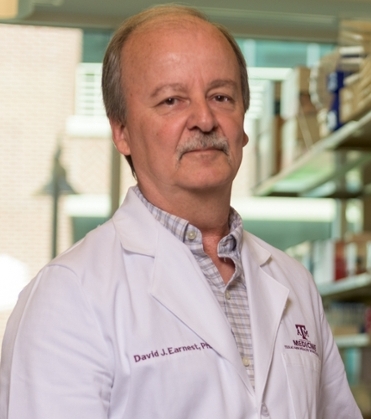David J. Earnest, PhD

Professor, Department of Neuroscience and Experimental Therapeutics, Biology
Center for Biological Clocks Research, Interdisciplinary Program in Neuroscience
Contact
Department of Neuroscience & Experimental Therapeutics
8447 John Sharp Pkwy
Bryan,
TX
77807-3260
dearnest@tamu.edu
Phone: tel:979.436.0328
Biography
Techniques
- Cell culture (explant, dissociated, cell lines, co-culture)
- Establishment of immortalized neural cell lines
- Gene transfer using retroviral vectors
- RT-PCR and in situ hybridization analysis of mRNA expression in brain and peripheral tissues
- Immunocytochemistry and immunoassay for neuropeptides
- Neural transplantation of fetal tissue and cells
- Real-time imaging of gene expression
- Analysis of rodent wheel-running behavior
Facilities
- Facilities and equipment necessary for performing cell culture, immunocytochemical, immunoassay and molecular methodologies;
- Computer-based data Acquisition System for Monitoring Locomotor Behavior, and luciferase-reported bioluminescence.
Earnest participates in graduate training as a member of the faculty in the Interdisciplinary Program in Neuroscience.
He is an executive member of the TAMU Center for Biological Clocks Research.
Funding
Texas A&M Health Science Center Seedling Grant (Optogenetic Therapy for Circadian Sleep Disorders and Cognitive Impairment during Aging)
WoodNext Foundation
Research Interests
- Earnest's research focuses on the cellular and molecular neurobiology of mammalian circadian rhythms. Normal regulation of 24-hour or circadian rhythms by the master biological clock in the suprachiasmatic nucleus (SCN) and by peripheral clocks throughout the body has an important impact on human health by providing for the temporal coordination of internal processes to occur at the "right time" relative to each other and to the external environment. Pathologies and environmental disturbances in the regulation of circadian rhythms have been linked to a variety of human health disorders including obesity and diabetes, increased cancer risk, cardiovascular disease, sleep-wake cycle disturbances, and depression. Research in his laboratory employs multidisciplinary approaches to study the cellular and molecular neurobiology of cell-autonomous circadian clocks and the signal transduction pathway responsible for circadian photoentrainment. The aims of current projects are to study: 1) the role of microRNAs (miRNAs) and other signaling molecules in the local temporal coordination of cell- and tissue-specific circadian clocks; 2) mutual interactions between the circadian clock mechanism, inflammatory signaling and metabolism; and 3) the mechanisms linking circadian rhythm disruption with metabolic disorders such as obesity and diabetes, and with pathological changes in neuroprotective responses to stroke: 1) how mutual interactions between the circadian clock mechanism and inflammatory signaling regulate metabolism; and 2) the role of brain-gut-immune interactions in linking circadian rhythm dysregulation with: a) metabolic disorders such as obesity and diabetes, b) pathological changes in neuroprotective responses to stroke, and c) accelerated cognitive impairment during aging.